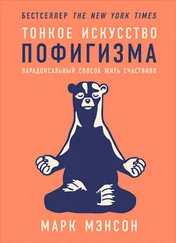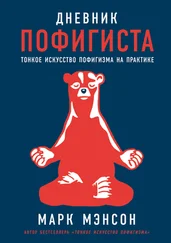Марк Мэнсон - The Subtle Art of Not Giving a F*ck
Здесь есть возможность читать онлайн «Марк Мэнсон - The Subtle Art of Not Giving a F*ck» весь текст электронной книги совершенно бесплатно (целиком полную версию без сокращений). В некоторых случаях можно слушать аудио, скачать через торрент в формате fb2 и присутствует краткое содержание. Год выпуска: 2016, Издательство: HarperCollins, Жанр: Самосовершенствование, на английском языке. Описание произведения, (предисловие) а так же отзывы посетителей доступны на портале библиотеки ЛибКат.
- Название:The Subtle Art of Not Giving a F*ck
- Автор:
- Издательство:HarperCollins
- Жанр:
- Год:2016
- ISBN:нет данных
- Рейтинг книги:5 / 5. Голосов: 2
-
Избранное:Добавить в избранное
- Отзывы:
-
Ваша оценка:
- 100
- 1
- 2
- 3
- 4
- 5
The Subtle Art of Not Giving a F*ck: краткое содержание, описание и аннотация
Предлагаем к чтению аннотацию, описание, краткое содержание или предисловие (зависит от того, что написал сам автор книги «The Subtle Art of Not Giving a F*ck»). Если вы не нашли необходимую информацию о книге — напишите в комментариях, мы постараемся отыскать её.
The Subtle Art of Not Giving a F*ck — читать онлайн бесплатно полную книгу (весь текст) целиком
Ниже представлен текст книги, разбитый по страницам. Система сохранения места последней прочитанной страницы, позволяет с удобством читать онлайн бесплатно книгу «The Subtle Art of Not Giving a F*ck», без необходимости каждый раз заново искать на чём Вы остановились. Поставьте закладку, и сможете в любой момент перейти на страницу, на которой закончили чтение.
Интервал:
Закладка:
“Victimhood chic” is in style on both the right and the left today, among both the rich and the poor. In fact, this may be the first time in human history that every single demographic group has felt unfairly victimized simultaneously. And they’re all riding the highs of the moral indignation that comes along with it.
Right now, anyone who is offended about anything— whether it’s the fact that a book about racism was assigned in a university class, or that Christmas trees were banned at the local mall, or the fact that taxes were raised half a percent on investment funds—feels as though they’re being oppressed in some way and therefore deserve to be outraged and to have a certain amount of attention.
The current media environment both encourages and perpetuates these reactions because, after all, it’s good for business. The writer and media commentator Ryan Holiday refers to this as “outrage porn”: rather than report on real stories and real issues, the media find it much easier (and more profitable) to find something mildly offensive, broadcast it to a wide audience, generate outrage, and then broadcast that outrage back across the population in a way that outrages yet another part of the population. This triggers a kind of echo of bullshit pinging back and forth between two imaginary sides, meanwhile distracting everyone from real societal problems. It’s no wonder we’re more politically polarized than ever before.
The biggest problem with victimhood chic is that it sucks attention away from actual victims. It’s like the boy who cried wolf. The more people there are who proclaim themselves victims over tiny infractions, the harder it becomes to see who the real victims actually are.
People get addicted to feeling offended all the time because it gives them a high; being self-righteous and morally superior feels good . As political cartoonist Tim Kreider put it in a New York Times op-ed: “Outrage is like a lot of other things that feel good but over time devour us from the inside out. And it’s even more insidious than most vices because we don’t even consciously acknowledge that it’s a pleasure.”
But part of living in a democracy and a free society is that we all have to deal with views and people we don’t necessarily like. That’s simply the price we pay—you could even say it’s the whole point of the system. And it seems more and more people are forgetting that.
We should pick our battles carefully, while simultaneously attempting to empathize a bit with the so-called enemy. We should approach the news and media with a healthy dose of skepticism and avoid painting those who disagree with us with a broad brush. We should prioritize values of being honest, fostering transparency, and welcoming doubt over the values of being right, feeling good, and getting revenge. These “democratic” values are harder to maintain amidst the constant noise of a networked world. But we must accept the responsibility and nurture them regardless. The future stability of our political systems may depend on it.
There Is No “How”
A lot of people might hear all of this and then say something like, “Okay, but how? I get that my values suck and that I avoid responsibility for all of my problems and that I’m an entitled little shit who thinks the world should revolve around me and every inconvenience I experience—but how do I change?”
And to this I say, in my best Yoda impersonation: “Do, or do not; there is no ‘how.’ ”
You are already choosing, in every moment of every day, what to give a fuck about, so change is as simple as choosing to give a fuck about something else.
It really is that simple. It’s just not easy.
It’s not easy because you’re going to feel like a loser, a fraud, a dumbass at first. You’re going to be nervous. You’re going to freak out. You may get pissed off at your wife or your friends or your father in the process. These are all side effects of changing your values, of changing the fucks you’re giving. But they are inevitable.
It’s simple but really, really hard.
Let’s look at some of these side effects. You’re going to feel uncertain; I guarantee it. “Should I really give this up? Is this the right thing to do?” Giving up a value you’ve depended on for years is going to feel disorienting, as if you don’t really know right from wrong anymore. This is hard, but it’s normal.
Next, you’ll feel like a failure. You’ve spent half your life measuring yourself by that old value, so when you change your priorities, change your metrics, and stop behaving in the same way, you’ll fail to meet that old, trusted metric and thus immediately feel like some sort of fraud or nobody. This is also normal and also uncomfortable.
And certainly you will weather rejections. Many of the relationships in your life were built around the values you’ve been keeping, so the moment you change those values—the moment you decide that studying is more important than partying, that getting married and having a family is more important than rampant sex, that working a job you believe in is more important than money—your turnaround will reverberate out through your relationships, and many of them will blow up in your face. This too is normal and this too will be uncomfortable.
These are necessary, though painful, side effects of choosing to place your fucks elsewhere, in a place far more important and more worthy of your energies. As you reassess your values, you will be met with internal and external resistance along the way. More than anything, you will feel uncertain; you will wonder if what you’re doing is wrong.
But as we’ll see, this is a good thing.
CHAPTER 6 You’re Wrong About Everything (But So Am I)
Five hundred years ago cartographers believed that California was an island. Doctors believed that slicing a person’s arm open (or causing bleeding anywhere) could cure disease. Scientists believed that fire was made out of something called phlogiston. Women believed that rubbing dog urine on their face had anti-aging benefits. Astronomers believed that the sun revolved around the earth.
When I was a little boy, I used to think “mediocre” was a kind of vegetable that I didn’t want to eat. I thought my brother had found a secret passageway in my grandmother’s house because he could get outside without having to leave the bathroom (spoiler alert: there was a window). I also thought that when my friend and his family visited “Washington, B.C.,” they had somehow traveled back in time to when the dinosaurs lived, because after all, “B.C.” was a long time ago.
As a teenager, I told everybody that I didn’t care about anything, when the truth was I cared about way too much. Other people ruled my world without my even knowing. I thought happiness was a destiny and not a choice. I thought love was something that just happened, not something that you worked for. I thought being “cool” had to be practiced and learned from others, rather than invented for oneself.
When I was with my first girlfriend, I thought we would be together forever. And then, when that relationship ended, I thought I’d never feel the same way about a woman again. And then when I felt the same way about a woman again, I thought that love sometimes just wasn’t enough. And then I realized that each individual gets to decide what is “enough,” and that love can be whatever we let it be.
Every step of the way I was wrong. About everything. Throughout my life, I’ve been flat-out wrong about myself, others, society, culture, the world, the universe—everything.
And I hope that will continue to be the case for the rest of my life.
Читать дальшеИнтервал:
Закладка:
Похожие книги на «The Subtle Art of Not Giving a F*ck»
Представляем Вашему вниманию похожие книги на «The Subtle Art of Not Giving a F*ck» списком для выбора. Мы отобрали схожую по названию и смыслу литературу в надежде предоставить читателям больше вариантов отыскать новые, интересные, ещё непрочитанные произведения.
Обсуждение, отзывы о книге «The Subtle Art of Not Giving a F*ck» и просто собственные мнения читателей. Оставьте ваши комментарии, напишите, что Вы думаете о произведении, его смысле или главных героях. Укажите что конкретно понравилось, а что нет, и почему Вы так считаете.












